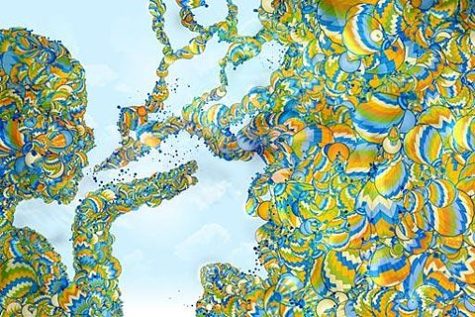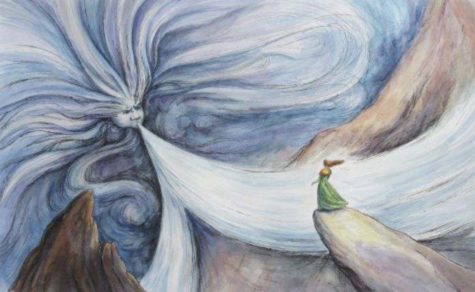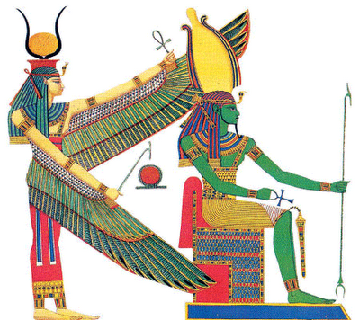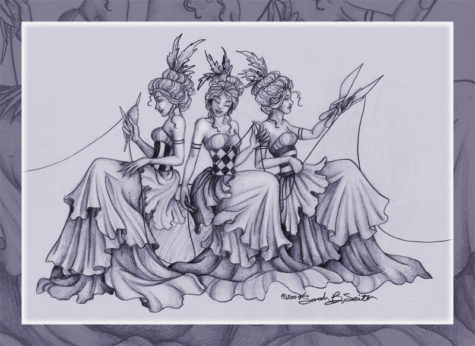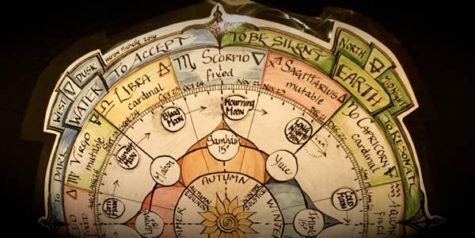Invocations
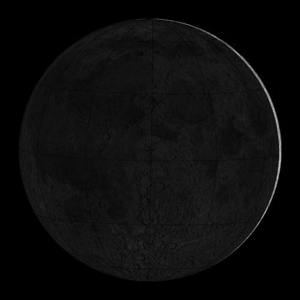 A spell to increase intuitive powers, to be said when the moon is dark:
A spell to increase intuitive powers, to be said when the moon is dark:
“Void of blackness, darkest night,
Ruled by Crone of power and might.
Push my instincts into life
So intuition grows and thrives.
Crone of Darkness, come to me
And let me know all things unseen.”
From: Everyday Magic
Many spells and rituals can be prefaced with an invocation to the winds. This is particularly true if you are often working with the winds.
The idea of invoking or calling the winds is an ancient one, dating back to at least classical Greece and certainly earlier. It is not only a summons of their power (all four winds to help your spell) but is also a general announcement to them of your intentions. This is made, in effect, to the entire world.
Summoning the powers of the winds and asking for their help is a great way to begin any spell. Here’s the technique:
Once you have assembled everything you need for the spell in the place you are performing it (preferably outside), turn to each direction in turn, and say something like the following:
Winds of the North!
Rushing and Mighty!
Aid me in my magical work!
Winds of the East!
Dazzling and Bright!
Aid me in my magical work!
Winds of the South!
Fiery and radiant!
Aid me in my magical work!
Winds of the west!
Gentle and buoyant!
Aid me in my magical work!
As you call the wind from each of the four quarters, stand for a moment. Feel that wind (if only in your imagination) blowing from that direction, roused by your magical call, gathering in speed as it rushes toward you with awesome force. Now proceed with the spell, secure that the ancient powers of the four winds are aiding your magic.
Working with one wind:
If you are performing a spell suited to one wind, just before you begin turn to the appropriate direction and say the words associated with it above.
From: Earth Power
- Colors: White, grey and black
- Element: Air
- Daily Meal: Raw cold food.
- Song: Wind’s Four Quarters
Altar: On cloth of shades between white and black, place four white and grey candles, a vase of flags and banners in the colors of a snowy night, a bell with a clear tone, a knife, a glass of white wine, and incense of cypress and juniper.
Offerings: Blowing curls of paper into the wind. Ringing bells or wind chimes. Study and learning, especially of a field of knowledge that is difficult for you.
Invocation to the North Wind
Breathe in!
Breathe in the wind of the North,
Cold and chill,
Ice-flecked wind that brings
The order for all life to sleep,
Forcing closed our tired eyes,
Wind that sweeps down from the poles,
Wind that sweeps away our resistance,
Wind that invites us to lie down
And embrace the darkness,
Whistling wind that comes in
Through the cracks and chinks
Of our fears and longings,
Breath of winter, wind that strokes the starry skies
Over the dead fields, and calls to us
With sere and weathered voice,
Black wind of night that cuts us
Like the razor-edged knife,
Have mercy on us!
Breathe in
And cleanse your body yet again.
Chant:
Boreas Boreas Breath of the North
Wind of knives
Wind chimes and bells are rung. Wine is poured as a libation. All process outside and release messages on small curls of paper into the north wind.
From: Pagan Book of Hours
The ancient Egyptians used this powerful meditation to infuse their bodies with light. Each body part was dedicated to a divinity who directed the flow of life energy. This meditation may be recited upon waking while standing in an eastern window facing the sun, or before sleeping while lying in repose. After deep relaxation, begin naming the parts of your body that you dedicate to the Divine:
My head is the head of Seshat,
filling with thoughts of the power of the Divine, remembering my soul’s purpose.
My face is the face of Nefertum,
the golden child arising above chaos in beauty.
My eyes are the eyes of Hathor
shining in the darkness. I see love and joy in all things.
My ears are the ears of Anubis,
hearing the messages of the Divine.
My nose and longs are the nose and lungs of Shu,
receiving fresh breezes that fill me with creative life energy.
My throat is the throat of Meret,
it’s words are gentle songs.
My lips are the lips of Mut.
What touches them receives my blessing and thankfulness.
My teeth are the teeth of Serket,
strong and nurturing.
My neck is the neck of the Renenutet,
which supports me and connects my intellectual, emotional, and physical bodies.
My right (or dominant) hand is the hand of Khnum,
endlessly creative, giving life to things of beauty.
My left (or nondominant) hand is the hand of Anket,
receiving abundance from the bounty of the world.
My forearms are the foreamrs of Neith,
who weaves the destiny of one humankind.
My shoulders are those of Wadjet,
powerful, healing, and strong.
My chest and rib cage are those of Tefnut,
containing and protecting the delicate inner parts of myself.
My heart is the heart of Ma’at,
living in truth and keeping my life in balance.
My backbone is the backbone of Seth,
the foundation of the world.
My womb is the womb of Isis.
(alternatively)
My phallus is the phallus of Osiris.
My reins are the reins of Satis,
receiving abundantly what is needed and eliminating what is not.
My belly and back are the belly and back of Sekhmet,
source of my spiritual fire and power.
My hips and legs are those of Nut,
carrying me safely through the day and night.
Wherever I need to be, there I find myself
My feet are the feet of Ptah,
a firm foundation for all of myself.
My fingers are those of Orion and Sirius,
sparkling and brilliant, creating anew, rebuilding, tearing down, heralding new life.
My bones are the bones of all the living gods and goddesses,
the living Uraei that protects and energizes and life to its spiritual source.
There is no member of my body that is not the member of a divine being. My body knows what it needs to give and to receive. Thoth and Isis shield my body wholly, filling it with energy and radiating love. I am shining as Ra and Raet day by day. These are the words of power that live forever. As I rise and walk on earth, so do I rise and walk always in the realm of heaven, under the nurturing care and the divine power of the gods and goddesses.
From: Feasts of Light
The Festival of Janus, or The Agonalia, was held in Ancient Rome on or around January 9th. Here is a ritual to celebrate the God of doorways, openings, and beginnings.
- Color: Dark Blue and Black
- Element: Air
- Altar: Upon cloth of dark blue and black place a ruler, and on one side things of the past, and on the other side things for the future, including a goblet of wine.
- Offerings: Measure something accurately. Any work requiring measuring is honored today.
- Daily Meal: Any old-fashioned recipe.
Invocation to Janus
Hail, Lord Who Looks Both Ways!
Hail, face of the past
Turned towards memory!
You see all that has been,
Not only our beginnings,
But our past deeds
Which have brought us to this day.
May we learn to take responsibility for them.
Hail, face of the future
Turned towards possibility!
You see all that might be,
A multitude of choices,
Yet that multitude is pruned
Back to a likely few
By the deeds of the past.
Hail, Lord who stands at the boundary
Of then and now, of there and here.
We stand also at that boundary.
Teach us to see how the past
Shapes the future in its hands,
That we may not be blind to our own divinity.
Chant:
Measure the line
With memory
Stand on the line
Of possibility
(Pour out the libation of wine and exit. Work today should concentrate on making or mending things. See especially to fences and gates. Planning for future events is also acceptable.)
Found at: Pagan Book of Hours
Here is a nice ritual to invoke favor from Weavers of Fate, the Moerae. It is particularly appropriate for birthdays, the New Year, the Kalends of January, or any day of significance and change. The Moerae (or Moirai) were supposed to appear three nights after a child’s birth to determine the course of its life, so this too would be an appropriate time for this ritual.
Who are they?
The Moerae are the three sisters who decide on human fate: Clotho, Lachesis, and Atropus. They sing in unison with the music of the Sirens, or so it is said. Lachesis sings of the things that were, Clotho of those that are, and Atropus about the things that will be. They are most honored among the gods because they distribute justly, and have a share in every home. They give men at their birth their share of evil and good, and they punish the transgressions of both men and of gods.
- Lachesis (the past): the apportioner of lots.
- Clotho (the present): is the spinner.
- Atropus (the future): is said to be the eldest, the best and the shortest of the sisters.
It has also been claimed that Tyche (Fortune) was one of the Moerae, and the most powerful of the sisters because beauty, virtue, and good Fame are in her keeping, and also because she finds pleasure in dashing immoderate hopes.
The Ritual
Colors: White, red, and black.
Element: Air
Altar: Drape with cloths of white, red, and black, and place upon it three candles in these same colors, three goblets in these same colors holding white wine, red wine, and elderberry wine, a spindle wound with handspun thread, a piece of woven cloth, and a large knife or pair of shears.
Offerings: Libations of wine.
Daily Meal: Vegan. Should be eaten in silence.
Invocation to the Moerae
(Light the white candle and raise the spindle.)
Spin truth into words,
Spin words into doom,
Spin doom into fortune,
Spin fortune into life,
Spin my life fine and strong,
O Lady with the spindle
Whose thread is my beginning.
(All take a piece of thread from the spindle. Pour out the white wine as a libation. Light the red candle and lift the woven cloth high.)
Weave truth into vision,
Weave vision into mind,
Weave mind into spirit,
Weave spirit into life,
Weave my life with depth and color,
O Lady with the shuttle
Whose tapestry is my existence.
(All knot their thread. Pour out the red wine. Light the black candle and lift the shears high.)
Cut truth away from falsehood,
Cut falsehood away from illusion,
Cut illusion away from matter,
Cut matter away from body,
Cut my body away from my life
When the time comes,
O Lady with the shears
Whose knowing hand is my doom
And also my truth.
(The leader of the ritual drapes his or her head with a cloth of black and walks around the circle, cutting each thread in silence. The cut threads are laid upon the altar as an offering, and all sit in silence, meditating on their Fate and that of the coming year. Leave in silence.)
From: Pagan Book of Hours
The following is of archaic Celtic origin. On the surface it is a triple recital of the thirteen months of the lunar year. Each word, however, is the name of one of the sacred trees, which in turn each have deep philosophical and magickal implications. Additionally, the thirteen, taken in sequence, tell in rich detail the life of the Sacred King and the archaic Legend of the Goddess.
All Witches should know or be strongly encouraged to study and research the hidden meanings behind this, working from the material provided by the poet Robert Graves (The White Goddess) .
Very powerful when done as a group, this chant can be done by the solitary practitioner as well. Provided here are the instructions for a group ritual, which can then be adjusted to suit an individual practice.
Prior to commencing the chant, everyone gathers in the circle, with the implications of the chant being described by whoever is leading the ritual. Pause in silence for a period of thirteen heartbeats while everyone meditates on what has been said, then the leader of the ritual intones the words of the chant loudly and in a rich voice. The chant is recited with all in the circle responding, three or nine times, as deemed appropriate. The chant is closed with the final invocation. If available, incense may be thrown into an incense brazier at the close of the chant. Everyone should remain silent for a while afterwords.
Here is the chant, which is repeated by all in the circle, slowly, and sounding each letter long and resonantly:
BETH
LUIS
NION
FEARN
SAILLE
UATH
DUIR
TINNE
COLL
MIN
GORT
PETH
RUIS
Repeat three or nine times as desired. I personally like the idea of repeating each individual name three times, and then repeating the entire sequence three times (which adds up to nine).
The leader of the circle closes with the following calling:
Benignissime
Solo Tibi Cordis,
Devotionem
Quotidianam Facio,
Blessed Be!
From: A Grimoire of Shadows
- Invocation to the Archangels as a Group by shirleytwofeathers - No Comment
- Invocation to Lord Melchizedek by shirleytwofeathers - No Comment
- Connecting with Fairies by shirleytwofeathers - No Comment
- To Enhance Clairvoyance by shirleytwofeathers - No Comment
- For Release of Addictions and Cravings by shirleytwofeathers - No Comment
- Using the Psalms for Solving Problems by shirleytwofeathers - 148 Comments
- Spiritual Assistance Spell by shirleytwofeathers - 35 Comments
- 62 Spells To Defeat Your Enemies by shirleytwofeathers - 27 Comments
- Once In A Blue Moon Spell by shirleytwofeathers - 24 Comments
- Spell To Find A Lost Pet by shirleytwofeathers - 12 Comments
Mauro: Ritual To Become A Werewolf
Mauro: Becoming A Werewolf Ritual
Janet Silva: Wheel of Fortune Change Your Luck Spell
Linda: Sweet Thoughts Bottle Spell
AnnD: Chant For Guidance
